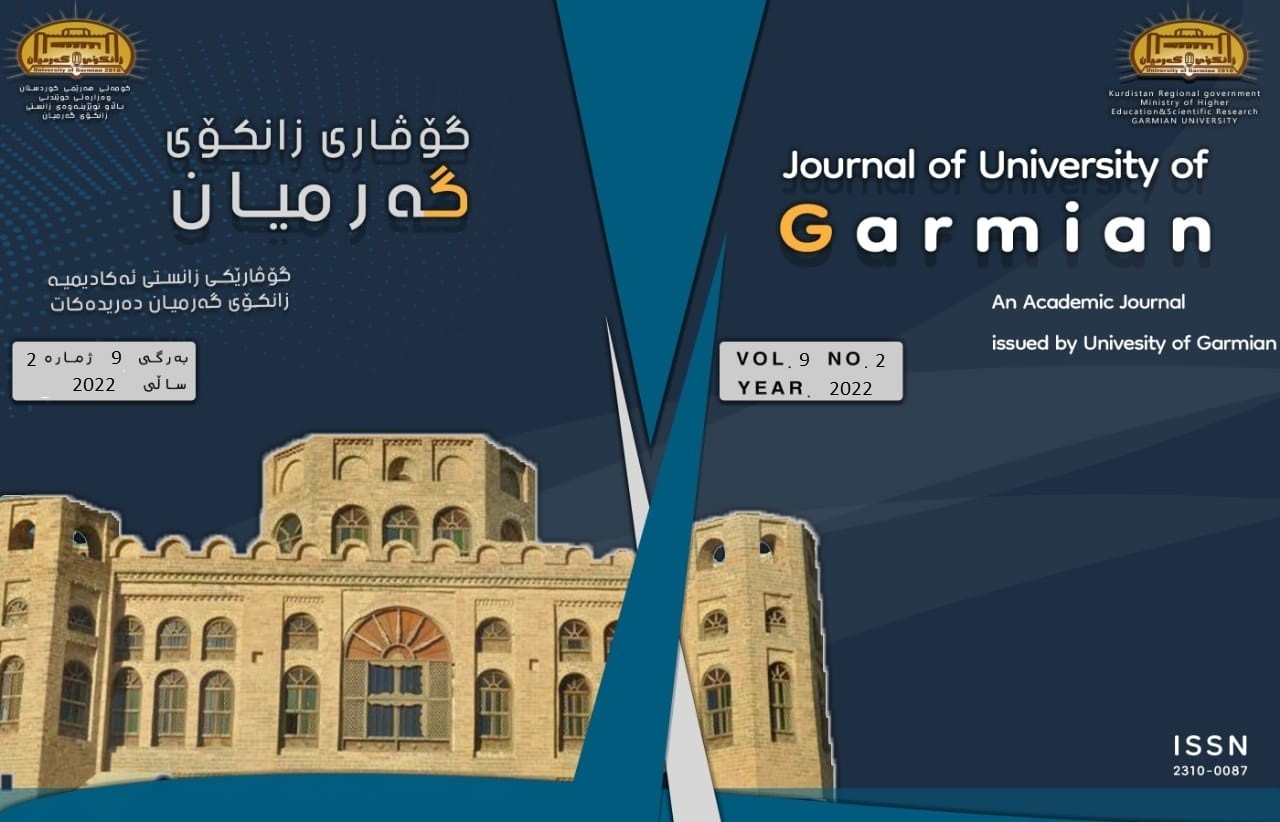Document Type : Original Article
Authors
Department of Sociology // College of Arts // Salahaddin University
Abstract
Rebellion and protest are a human and historical phenomenon known to most societies and different human cultures. This phenomenon is characterized by its ability to disrupt social, political and cultural structures, especially the structures of regimes characterized by their authoritarian and tyrannical tendencies.
Both Iraq and the Kurdistan Region are witnessing a remarkable growth in the forms and images of protests in recent years. On more than one occasion, protest movements have appeared and are practicing their denouncing action in response to political, social, economic and psychological pressures, and human rights setbacks, by (the state) or others, perhaps the most prominent of which is Which has become surfacing related to the series of failures that resulted from the inability of the political elite to provide alternatives and solutions to the dilemmas in which society has become floundering and which ended with the emergence of multiple behavioral patterns that express blatant protest tendencies among young people, especially protesters, such as discontent, grumbling and rebellion against the deteriorating social reality due to The spread of unemployment and poor services, which resulted in many behavioral deviations and social problems, among large groups and sectors of young people, such as addiction and involvement in theft gangs and the expansion of the phenomenon of extremism and violence.
Accordingly, this study aims to provide a sociological vision about the dialectic of the relationship between frustration and protest tendencies among the Kurdish youth, and to analyze the reasons behind this phenomenon, which seem to many observers and researchers necessitating research in view of the rapid political transformations taking place locally, regionally and even internationally.
Keywords
أولاً: باللغة العربية:
- إبراهيم، حسنين توفيق (1999)، ظاهرة العنف السياسي في النظم العربية، ط2، مركز الدراسات الوحدة العربية، بيروت- لبنان.
- الحايس، عبد الوهاب جودة (2015)، تقدير الاحتياجات الأساسية للسكان المحليين كمدخل للتنمية الشاملة، (دراسة منشورة)، دار التل للطباعة، مجلة دراسات في التنمية والمجتمع، العدد:3.
- الحفني، عبد المنعم (2005)، موسوعة عالم علم النفس، ج1، ط1، مكتبة مدبولي، مصر.
- دافيدوف، لندال (1983)، مدخل الى علم النفس (ترجمة: سيد الطواب وآخرون)، دار ما كجرو هيل للنشر ودار المريخ للنشر، الرياض – السعودية.
- صليبا، جميل (1985)، المعجم الفلسفي، (ثلاثة أجزاء)، ذوي القربى للنشر، قم- إيران.
- عبد الحميد، شاكر (2017)، التفسير النفسي للتطرف والإرهاب، ط1، سلسلة مراصد، العدد (37)، وحدة الدراسات المستقبلية بمكتبة الإسكندرية- مصر.
- غباري، ثائر أحمد؛ وأبو شعيرة، خالد محمد (2015)، سيكولوجية الشخصية، ط1، مكتبة المجتمع العربي، عمان – الأردن.
- غير، تيد روبرت (2004)، لماذا يتمرد البشر؟، ط1، ترجمة ونشر مركز الخليج للأبحاث، دبي، الامارات العربية المتحدة.
- القليوبي، خالد محمد (2010)، الإحباط عند الشباب.. الأسباب والعلاج، (مقال) على موقع: المدينة أونلاين، متاح على الرابط: https://www.al-madina.com/article/42774/
- محمد، فائيز إبراهيم (2019)، الأنومي الاجتماعي في إقليم كوردستان، دراسة ميدانية (باللغة الكوردية)، ط1، معهد السياسات العامة، مطبعة رۆژههلات – أربيل -العراق.
- مصطفى، يوسف حمة صالح (2013)، شباب العراق/ تحديات وفرص من الاقصاء الى المواطنة، بحث منشور في وقائع منظمة الأمم المتحدة/ برنامج التنمية البشرية.
- المؤشر العربي، تقرير المركز العربي للأبحاث ودراسة السياسات، 2019 / 2020،
- المليجي، حلمي (2000)، علم النفس الاكلينيكي، ط1، دار النهضة العربية، بيروت –لبنان.
- منظمة الهجرة الدولية (IOM) (2013)، التقرير السنوي، اصدار المنظمة الدولية للهجرة، سويسرا.
- النعيمي، خالد عبدالرحمن (2007)، السلوك العدواني المتعلم قراءة تحليلية لنظرية الإحباط –العدوان، دراسة (منشورة)، في مجلة كلية التربية جامعة المستنصرية، العدد (4).
- نظمي، فارس كمال (2010)، المحرومون في العراق هويتهم الوطنية واحتجاجاتهم الجمعية دراسة في سيكولوجية الظلم، ط1، دار ومكتبة البصائر، بيروت، لبنان.
- نظمي، فارس كمال (2017)، سيكولوجيا الاحتجاج في العراق، ط1، دار سطور للنشر والتوزيع، العراق.
- هيئة إحصاء إقليم كوردستان (2019)، مسح الفتوة والشباب / خلاصة وتحليل المسح.
ثانيا: باللغة الإنجليزية:
- Bussert, Walter & D’Ambrosio, Conchita & Peragine, Vito (2005): Deprivation and Social Exclusion, European Commission-DG Research Sixth Framework Program (Polarization and Conflict Project CIT-2-CT-2004-506084),
- British Council (2013), The revolutionary promise: youth perceptions in Egypt, Libya an d Tunisia, John D. Gerhart center for philanthropy and civic engagement.
- Dowse, Robert Edward. & Hughes, John A. (1972). Political sociology. London; New York: Wiley.
- Feldman, Robert S. (1985). Social psychology: theories, research, and applications / Robert S. Feldman. New York: McGraw-Hill.
- Gilbert, P. (1997). The evolution of social attractiveness and its role in shame, humiliation, guilt and therapy. British journal of medical psychology,70 (2),113-147.
- Pettigrew, T. F. (2001). Summing up: Relative deprivation as a key social psychological concept. In I. Walker & H. Smith (Eds.), Relative deprivation: Specification, development and integration (pp. 351-373). New York: Cambridge University Press.
Feldman, Robert S. (1985). Social psychology: theories, research, and applications / Robert S.

